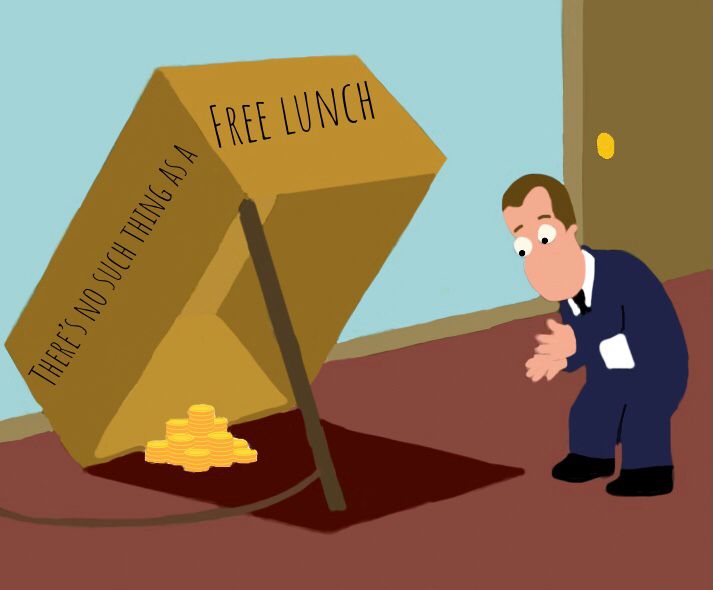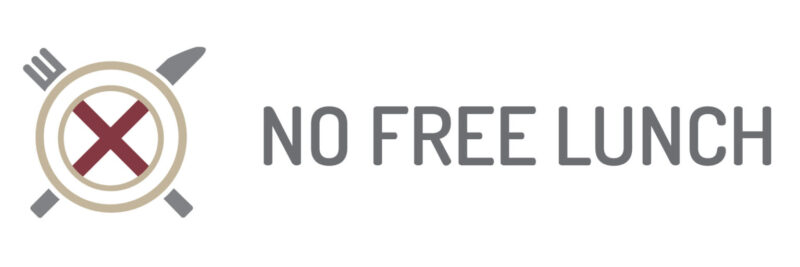The meaning of the phrase ‘there is no such thing as a free lunch‘ and the acronym TINSTAAFL.

The phrase there is no such thing as a free lunch means that nothing in life comes for free. It is used as a common sense reminder that any financial offer or opportunity that seems too good to be true will always have a hidden catch.
What does TINSTAAFL mean?
The phrase ‘there is no such thing as a free lunch’ is quite a mouthful, so it is often abbreviated to the acronym TINSTAAFL and pronounced as a word. like NASA or FOMO.
As there is also an alternate, more casual version of the phrase – ‘there ain’t no such thing as a free lunch’ – you’ll also see the acronym TANSTAAFL used.
With the definition and acronyms out of the way, let’s look at some practical examples of the law of TINSTAAFL.
No Free Lunch Examples
When we say that nothing is ever free, and there is always a catch to something that is promoted as a free lunch, the most obvious cost is financial. Here’s a simple example:
- You’re offered a free bag of luxury popcorn – yes, please!
You just need to pay for the post and package – sigh.
Sometimes, the financial cost of a free lunch type proposition is harder to spot because the offer is more complex than an offer of free popcorn. This often comes down to clever marketing and impenetrable terms and conditions.
Here’s an example of a more complex free lunch type proposition, free spins from an online casino:
- Sign-up now and get 100 free spins, no deposit needed!
Where’s the catch here? I don’t have to deposit, so it’s essentially a free hit.
Not so fast, cowboy. The terms of free spin offers include a wagering requirement which gives you a tiny chance that you can ever withdraw any real cash.
Free Spin offers are designed to get you interested in the game and stoke a desire to play with real money, at which point you will lose in the long run because that is how casinos work.
What no free lunch really means
Looking at the two examples so far, what the phrase ‘there’s no such thing as a free lunch’ really means is that money doesn’t come for free.
Most people would be satisfied with that as an explanation and move on, but to really understand the free lunch concept, you have to understand the function of money.
Despite all of our lives revolving around earning and using money, only a tiny per cent of the population would be able to give you a good explanation as to what money is.
Money is just a tool for moving energy across space and time. Now, this might sound like something someone on magic mushrooms might say, but it is actually fairly intuitive.
Unless you want to live a subsistence lifestyle, where you make or grow everything you need to survive, you’ll need to exchange/trade with others.
Whatever you trade will represent a certain amount of energy you have expended in creating it. Though you can try and exchange like for like (barter) or work on a credit system, since around 700 BC, we’ve used money as a tool to make that exchange easier.
This is why we can describe money as a tool to move our energy across space and time.
To dig into that concept, our framework for understanding the law of TINSTAAFL starts by looking at how energy is created and transferred but to understand more about the free lunch concept, we need to look at its formal economic definition.
No free lunch meaning in economics
Though the no free lunch idea has an intuitive meaning, that nothing in life comes for free, there is also a formal definition taught as part of economics 101.
The study of economics is built on three principles: scarcity, choice and opportunity cost. This trio of concepts can provide a formal explanation as to why there is no such thing as a free lunch.
Our energy is scarce, so every economic choice we make comes at the expense of doing something else – the opportunity cost. That alternative can be assigned some value, so no choice we ever make can be truly free.
The origin of the no free lunch in economics can be attributed to Nobel Prize Winner, Milton Friedman, who wrote a famous book on the subject.
Why free is never free
If you think about the economist’s idea of decision-making based on scarcity, choice, and opportunity cost, you should start to see why nothing can ever really be described as free.
Every choice requires some energy, whether emotional, psychological or physical, which is at the expense of some alternative. Defining that alternative in dollars and cents might be next to impossible, but it’s hard to deny that there is always an alternative choice.
Here’s an example of a free offer that has a hidden, non-financial, cost which previously you might have thought of as free:
- A friend offers you a lift to the train station, which is really kind as it’s raining, and otherwise, you’ll arrive at a job interview looking like a drowned rat. Free lift, result! Surely, this time there can be no catch?
Unfortunately not, because there were alternatives to accepting the lift, which brings with it the burden (cost) of expectation that the favour may need to be reciprocated in the future.
No free lunch & machine learning
Alongside its use in explaining the fundamental principles of scarcity, choice and opportunity cost in economics the no free lunch idea has a specific meaning within machine learning.
The no free lunch theorem developed by mathematicians David Wolpert and William Macready in 1997 states that “all optimization algorithms perform equally well when their performance is averaged across all possible problems.”
Dumbed down, the no free lunch theorem pushes back on the idea that machine learning algorithms could be optimised for success.
Free lunch & the philosophy science
If you’ve read this far you might have started to realise that what seems like a throwaway phrase is actually fundamental to everything that we do.
In fact, the meaning of the no free lunch concept can be traced all the way back to Great Greek thinkers like Epicurus and their ideas about how energy in the universe was finite.
You can explore that rabbit hole in a separate article looking at the connection between the no free lunch concept and the philosophy of science.
You can also read about the origins of the use of the no free lunch idea in print and society, or jump to our blog and read about all the weird and whacky ways people have tried in vain to break one of the fundamental laws of the universe: there is no such thing as a free lunch.
FAQs
‘There’s no such thing as a free lunch’ means that nothing in life comes for free. It is sometimes abbreviated to the acronym tinstaafl or tanstaafl and is used as a common sense reminder that any financial offer or opportunity that seems too good to be true will always have a hidden catch.
Tanstaafal is an acronym for ‘there ain’t no such thing as a free lunch’. An acronym is a type of abbreviation that is pronounced as a word.
Tinstaafal is an acronym for ‘there is no such thing as a free lunch’. An acronym is a type of abbreviation that is pronounced as a word.
No Free Lunch
There is no such thing as a free lunch, but if you’re hungry to find out why, we’re here to help.
You can learn the meaning and origin of the no free lunch concept, as well as the broader philosophy behind the idea that nothing can ever be regarded as free.
We look at our relationship with money and truth, examining all of the supposed shortcuts, life hacks and get-rich-quick schemes.
